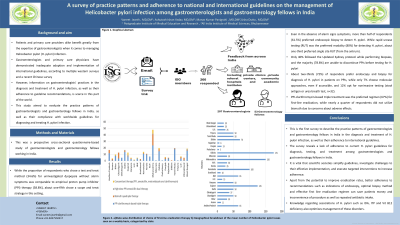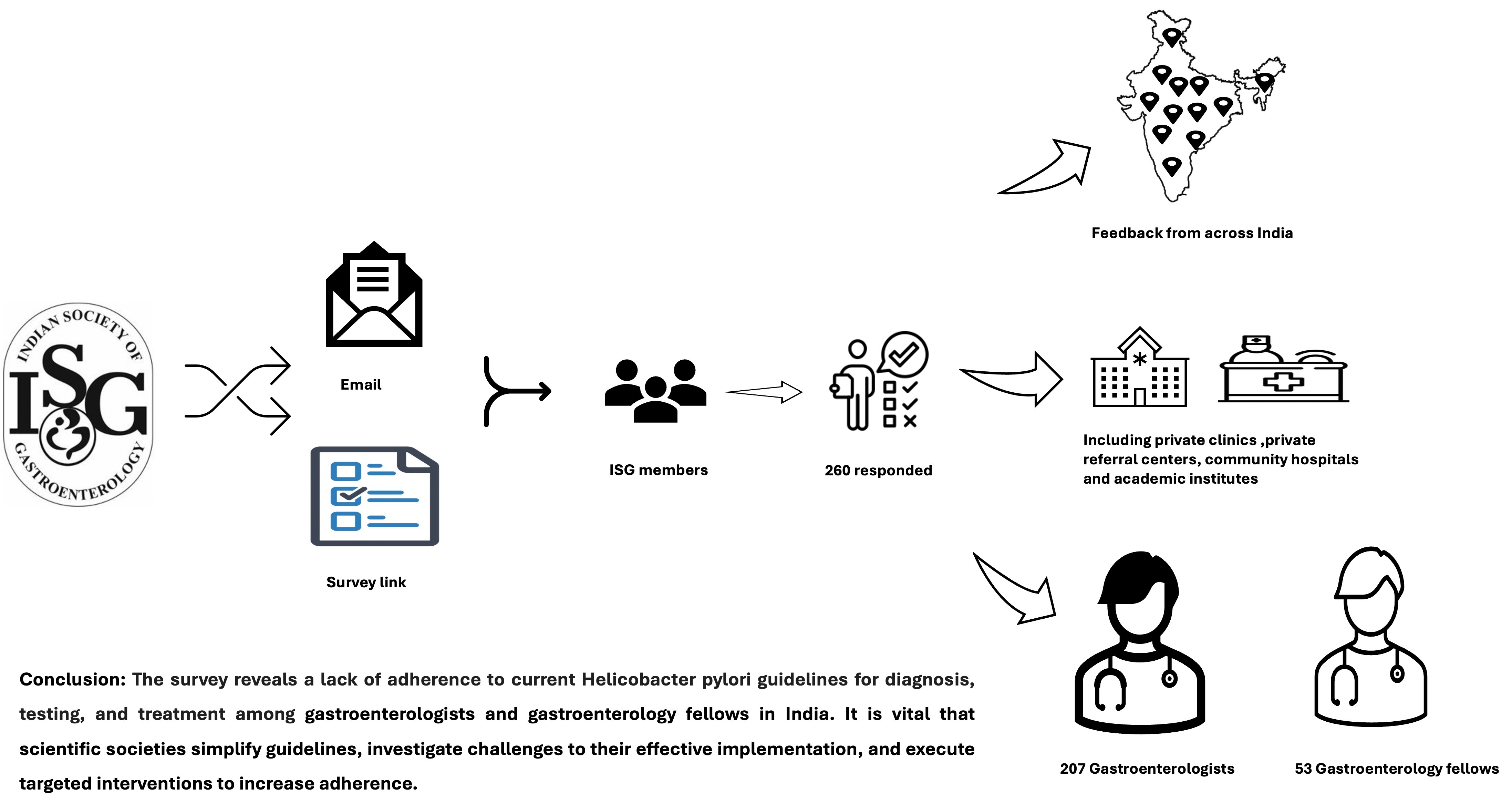Sunday Poster Session
Category: Stomach
P1616 - A Survey of Practice Patterns and Adherence to International Guidelines on the Management of Helicobacter pylor Infection Among Gastroenterologists and Gastroenterology Fellows in India
Sunday, October 27, 2024
3:30 PM - 7:00 PM ET
Location: Exhibit Hall E

Has Audio
- VJ
Vaneet Jearth, MBBS, MD, MRCP
Postgraduate Institute of Medical Education and Research
Chandigarh, Chandigarh, India
Presenting Author(s)
Vaneet Jearth, MBBS, MD, MRCP1, Ashutosh Ishan Yadav, MD1, Manas Kumar Panigrahi, MD2, Usha Dutta, MD, FACG1
1Postgraduate Institute of Medical Education and Research, Chandigarh, Chandigarh, India; 2All India Institute of Medical Sciences, Bhubaneshwar, Orissa, India
Introduction: Patients and primary care providers alike benefit greatly from the expertise of gastroenterologists when it comes to managing Helicobacter pylori (H. pylori) infection. However, in India, information on gastroenterologists' practices in managing H. pylori infection is scarce. This study aimed to evaluate the practice patterns of gastroenterologists and gastroenterology fellows in India.
Methods: This was a cross-sectional, questionnaire-based survey. We formed a focus group of four gastroenterologists with a special interest in H. pylori to help us conceptualize the survey's themes, followed by internal validation. All participants were required to express electronic consent. The first section focused on the demographics and work profiles of the participants.Figure 1 depicts methodology in a graphical abstract.
Results: A total of 207 gastroenterologists and 53 fellows filled out the questionnaire (Table 1).We received responses from all over India. Approximately 70% of respondents perceive H. pylori to be a gastric pathogen, while 20% regard it as a commensal bacterium. Although the proportion of respondents who chose a test and treat method (34.6%) for uninvestigated dyspepsia without alarm symptoms was comparable to empirical proton pump inhibitor (PPI) therapy (38.8%), approximately one-fifth of respondents opted for a scope and treat strategy. Even in the absence of alarm signs, more than half of respondents (61.5%) preferred endoscopic biopsy to detect H. pylori. While rapid urease testing (RUT) was the preferred modality (80%) for detecting H. pylori, about one-third preferred single-site RUT (from the antrum). Only 40% followed the updated Sydney protocol while performing biopsies, and the majority (78.8%) are unable to discontinue PPIs before testing for H. pylori. For first-line therapy, PPI-clarithromycin-based triple treatment was the preferred regimen (67%), while nearly a quarter of respondents did not use bismuth due to concerns about adverse effects.
Discussion: This is the first comprehensive study to describe the practice patterns of gastroenterologists and gastroenterology fellows in India for the management of H. pylori infection, as well as their adherence to international guidelines. The survey demonstrates a disparity between real-world practices and the consensus from major society guidelines. It is vital that scientific societies simplify guidelines, investigate challenges to their effective implementation, and execute targeted interventions to increase adherence.

Note: The table for this abstract can be viewed in the ePoster Gallery section of the ACG 2024 ePoster Site or in The American Journal of Gastroenterology's abstract supplement issue, both of which will be available starting October 27, 2024.
Disclosures:
Vaneet Jearth, MBBS, MD, MRCP1, Ashutosh Ishan Yadav, MD1, Manas Kumar Panigrahi, MD2, Usha Dutta, MD, FACG1. P1616 - A Survey of Practice Patterns and Adherence to International Guidelines on the Management of <i>Helicobacter pylor</i> Infection Among Gastroenterologists and Gastroenterology Fellows in India, ACG 2024 Annual Scientific Meeting Abstracts. Philadelphia, PA: American College of Gastroenterology.
1Postgraduate Institute of Medical Education and Research, Chandigarh, Chandigarh, India; 2All India Institute of Medical Sciences, Bhubaneshwar, Orissa, India
Introduction: Patients and primary care providers alike benefit greatly from the expertise of gastroenterologists when it comes to managing Helicobacter pylori (H. pylori) infection. However, in India, information on gastroenterologists' practices in managing H. pylori infection is scarce. This study aimed to evaluate the practice patterns of gastroenterologists and gastroenterology fellows in India.
Methods: This was a cross-sectional, questionnaire-based survey. We formed a focus group of four gastroenterologists with a special interest in H. pylori to help us conceptualize the survey's themes, followed by internal validation. All participants were required to express electronic consent. The first section focused on the demographics and work profiles of the participants.Figure 1 depicts methodology in a graphical abstract.
Results: A total of 207 gastroenterologists and 53 fellows filled out the questionnaire (Table 1).We received responses from all over India. Approximately 70% of respondents perceive H. pylori to be a gastric pathogen, while 20% regard it as a commensal bacterium. Although the proportion of respondents who chose a test and treat method (34.6%) for uninvestigated dyspepsia without alarm symptoms was comparable to empirical proton pump inhibitor (PPI) therapy (38.8%), approximately one-fifth of respondents opted for a scope and treat strategy. Even in the absence of alarm signs, more than half of respondents (61.5%) preferred endoscopic biopsy to detect H. pylori. While rapid urease testing (RUT) was the preferred modality (80%) for detecting H. pylori, about one-third preferred single-site RUT (from the antrum). Only 40% followed the updated Sydney protocol while performing biopsies, and the majority (78.8%) are unable to discontinue PPIs before testing for H. pylori. For first-line therapy, PPI-clarithromycin-based triple treatment was the preferred regimen (67%), while nearly a quarter of respondents did not use bismuth due to concerns about adverse effects.
Discussion: This is the first comprehensive study to describe the practice patterns of gastroenterologists and gastroenterology fellows in India for the management of H. pylori infection, as well as their adherence to international guidelines. The survey demonstrates a disparity between real-world practices and the consensus from major society guidelines. It is vital that scientific societies simplify guidelines, investigate challenges to their effective implementation, and execute targeted interventions to increase adherence.

Figure: Graphical abstract
Note: The table for this abstract can be viewed in the ePoster Gallery section of the ACG 2024 ePoster Site or in The American Journal of Gastroenterology's abstract supplement issue, both of which will be available starting October 27, 2024.
Disclosures:
Vaneet Jearth indicated no relevant financial relationships.
Ashutosh Ishan Yadav indicated no relevant financial relationships.
Manas Kumar Panigrahi indicated no relevant financial relationships.
Usha Dutta indicated no relevant financial relationships.
Vaneet Jearth, MBBS, MD, MRCP1, Ashutosh Ishan Yadav, MD1, Manas Kumar Panigrahi, MD2, Usha Dutta, MD, FACG1. P1616 - A Survey of Practice Patterns and Adherence to International Guidelines on the Management of <i>Helicobacter pylor</i> Infection Among Gastroenterologists and Gastroenterology Fellows in India, ACG 2024 Annual Scientific Meeting Abstracts. Philadelphia, PA: American College of Gastroenterology.
